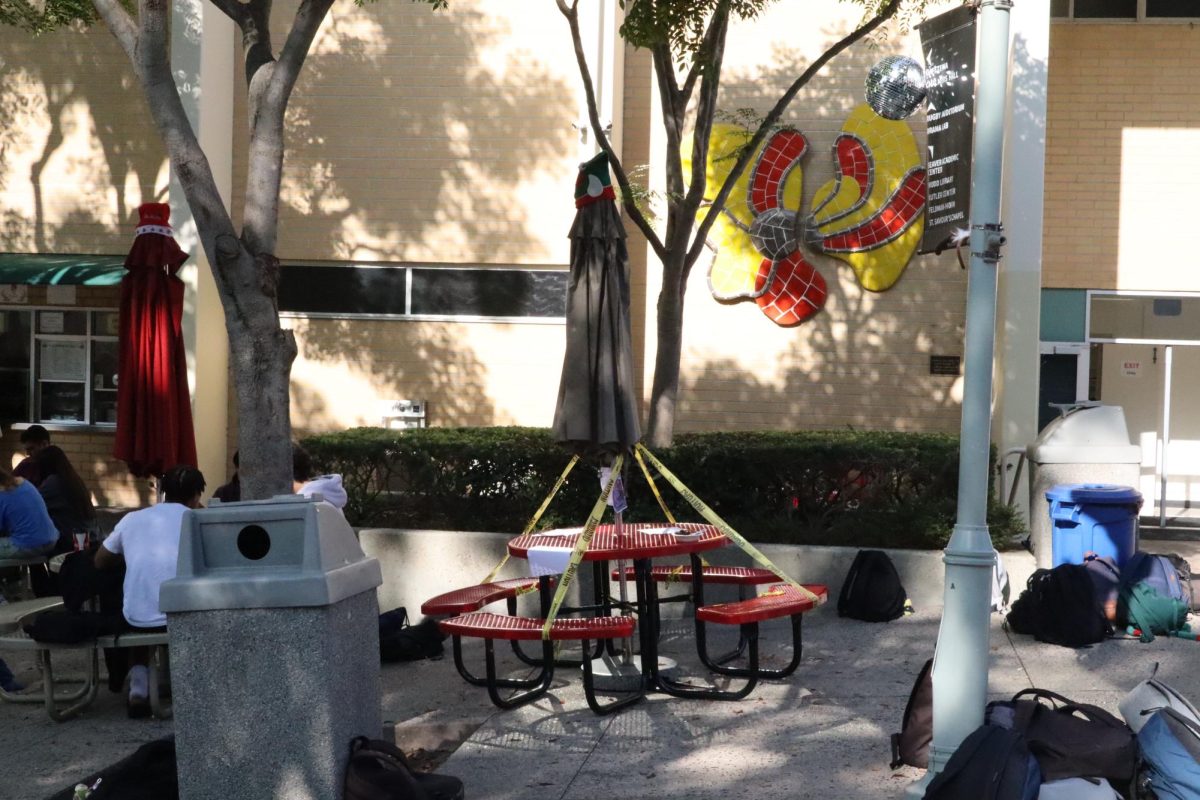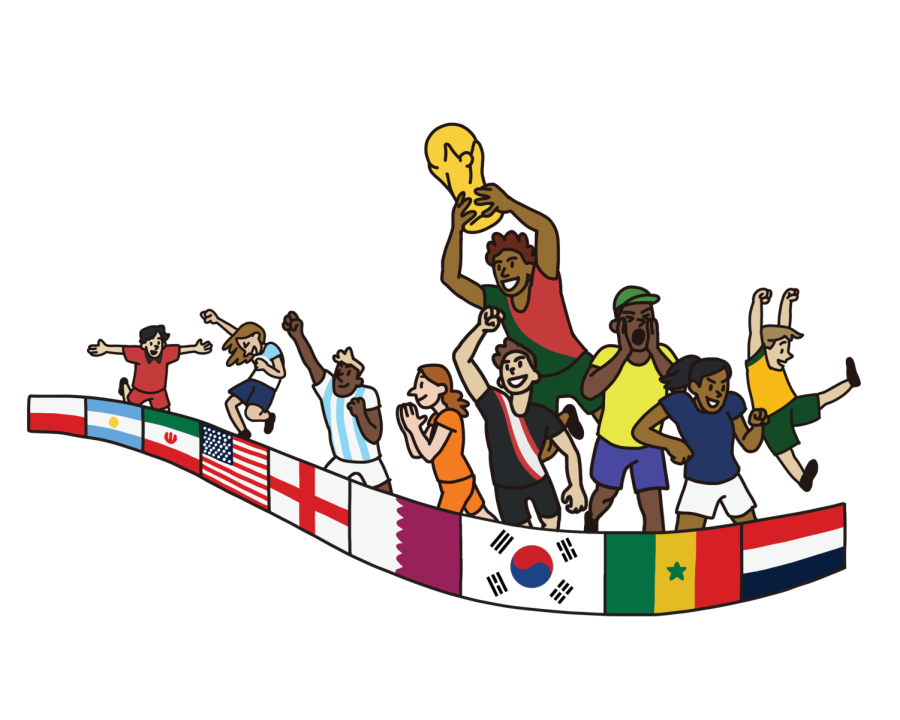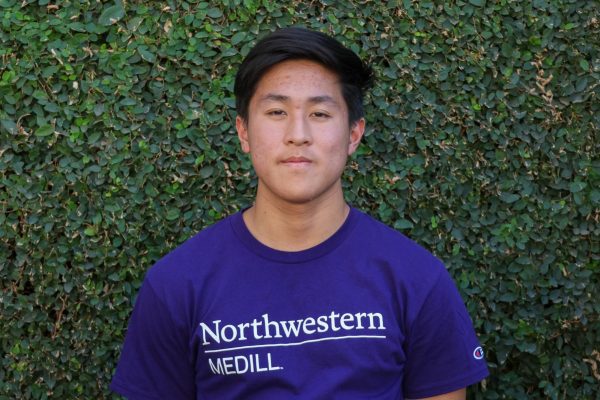Getting a Kick Out of It
December 12, 2022
As JT Federman ’24 shifted onto the edge of his seat in Rugby Auditorium, he said he felt a creeping sense of anxiety fill the room. Students and faculty members alike had gathered during their lunch period to watch the United States take on Iran in a must-win group stage game during the 2022 FIFA World Cup. As the first half went on, Federman noticed a lack of positivity in the room. There had been plenty of goal-scoring opportunities for the U.S., but through thirty minutes of play, they had nothing to show for it. Just when people began to head to their next class, however, things suddenly changed.
In an instant, U.S. right back Sergiño Dest slipped behind the defense, heading the ball to left winger Christian Pulisic, who sprinted past two defenders and scored. After the goal, Federman said the mood in Rugby was electric.
“It was an absolutely fantastic environment,” said Federman. “That goal hyped everybody up, and they just went crazy all of a sudden. Everyone was in similar spirits, and we were all rooting for the USA. The most upsetting thing was that we had class five minutes after that because we all wanted to keep watching the game even more after that goal.”
The World Cup is an international soccer tournament that occurs once every four years. Though it is usually a summer event, the tournament kicked off in late November this year due to the hot weather in the host nation of Qatar. Because of this, 2022 is the first year the World Cup has been held during the school year. Federman said the school environment played an important role in building momentum for the game against Iran.
“It’s been awesome to have the World Cup during school,” Federman said. “Everybody’s interested in what the scores are and what’s happening at all times, even if they aren’t soccer fans. Usually in the summer, you have fewer people watching and fewer people excited for it. It’s also been a good way to skip some class time and watch the games in class.”
As a team captain of the soccer team himself, Federman said the World Cup offers a unique opportunity for people to understand the sport by supporting their country.
“In the past, people have thought of soccer as a very boring, not interesting sport to watch,” Federman said. “But to have the whole school interested in watching each game, to have them cheering and wearing USA jerseys to school just shows that there is love for the sport. The entire world is involved and excited to watch the World Cup, and that’s very important, especially for me as a soccer player.”
Aidan Mazdisnian ’25 attended a World Cup game in Qatar during Thanksgiving Break, which he said was an experience he will remember for the rest of his life.
“I decided to go to the World Cup because I’ve always wanted to go with my brother since we were kids,” Mazdisnian said. “[Going to the World Cup] was an unforgettable memory. I went to the Iran versus Wales game, and Iran scored a 98th minute winner. The crowd went crazy, and the atmosphere was super exciting. Overall, I would say this was an incredible experience and the best sports event I have been to.”
Manu Markman ’23 also attended two of Argentina’s group-stage games during the World Cup. Though he immigrated to the U.S. at the age of two, Markman said he still supports his home country of Argentina in the World Cup and appreciated being able to cheer them on.
“When we’re winning, the mood is just great,” Markman said. “But when we’re losing, or even when we’re still tied, it’s as close as you can get to having a heart attack without actually having one. There’s nothing like watching an Argentina game because the team is always so unpredictable.”
After going on a 36-match unbeaten streak leading up to the tournament, Argentina lost in shocking fashion to Saudi Arabia in their first game of the group stage. As a result, Markman said the atmosphere at the game between Argentina and Mexico was even more heated than usual because only a win would secure a bid to the round of 16.
“Mexican and Argentinian fans already really hate each other because we each think that we have the best team in the world,” Markman said. “Argentina definitely has a little bit more merit to that claim, but regardless the atmosphere was very tense. The Mexico fans actually started chanting ‘where’s [Lionel] Messi’ at halftime, even though the game was tied at zero to zero.”
Even though the rivalries at the World Cup are passionate, Markman said some of his best memories from his time in Qatar came from interacting with other fanbases.
“Brazilians tend to travel in droves to World Cups, but there weren’t many when I was there,” Markman said. “Because of that, there were some Argentine fans that went to the Brazilian fan festival, and when we were walking through Doha, we saw that they were hanging Argentina flags all around, which I thought was funny.”
Markman also said that traveling to the World Cup allowed him to better connect with his identity.
“Whenever I watch soccer, I think of it as sort of relating to my Argentinian background,” Markman said. “Going to the World Cup, especially to support Argentina, was the culmination of that. To be there with the fans and chant was amazing. There’s even sort of a phenomenon where it improves my Spanish. I like to think it’s because I’m in the zone and with other people who have an Argentinian background. That’s sort of a big part of why I love soccer.”
At the school, many other students have found joy in supporting a team that connects to their cultural identity. Lucca Van Der Woude ’25, whose father is from the Netherlands and mother is from Argentina , said the World Cup reinforces his connection to his heritage.
“It strengthens my identity because in some places, like for example where I’m from in Argentina, it shows traditions and brings people together,” Van Der Woude said. “In Argentina, football is more than just a sport, so when the World Cup happens it’s a very big thing and a very big part of the culture.”
Connor Kim ’25, who supported South Korea in the tournament, said that watching his team on the biggest stage gave him pride in his identity.
“Cheering for my team gives me great pride about my background,” Kim said. “Normally I wouldn’t waste my time watching a football game, but because it is the World Cup, of course I am going to make an effort to watch my people and my country represent. The fact that I can be proud of the people on the field really strengthens my cultural identity.”
Members of the school community supporting the U.S. were able to find pride in rooting for the American squad. Morgan Beckerman ’24 said that he appreciated the team’s passion and hard work.
“I’m normally not that big of a soccer fan,” Beckerman said. “Watching the United States go out and give it their all really ignited my love for the game and our country again. I’m starting to watch more soccer now because of it.”
Though Federman is only rooting for the U.S. in this competition, he said it was exciting for him to see students support different countries and cultures.
“The power of sports is really its ability to bring people together,” Federman said. “Even though I support the United States, I love arguing with my friends who support other countries about who’s team is better and just talking about the game in general. The World Cup is a great time for us to support the game we all love.”






























